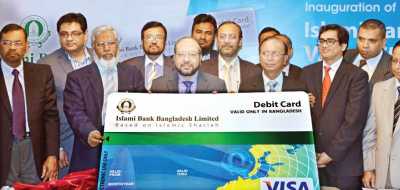Banking
IFIC Bank holds annual business conference

IFIC Bank organised an annual business conference-2014 at a hotel in Dhaka on Thursday.
Md Lutfar Rahman, Chairman of Executive Committee of IFIC Bank, presided over the conference as chief guest, said a press release.
Members of the board of directors Syed Anisul Haque and Monirul Islam attended the function.
Govt may go for big bank borrowing
After taking a cautionary stance from the beginning of this fiscal, the government is likely to go for borrowing big sums from the banking system in the later half of the current financial year to meet the fiscal expenditure amid lower revenue growth and scarce resources, sources in the finance ministry said.
The target of borrowing from banks has been set at Tk 25,993 crore for 2013-14 fiscal. However, as of February 9, the government borrowed only Tk 3,729.50 crore from the banking system, according to Bangladesh Bank (BB) statistics.
Two reasons for the low-scale borrowing are cited: the government maintained a cautious policy in bank borrowing during the first six months of the current FY compared to the previous year and there had been a slowdown in development activities that eventually led to ADP cuts.
The government borrowed Tk 7782.15 crore during the same period in the last fiscal, and the borrowing increased abnormally at the end of June 2013.
Analysts largely attributed the less enthusiasm in bank borrowing to a lower development spending for prolonged political unrest over the parliament-election issue as well as trial of the war-crime accused.
Though the impact of the revenue shortfall has been addressed partly by curtailing the size of the Annual Development Programme (ADP) in the revised budget, the government’s bank-borrowing target remains unchanged as the fiscal-expenditure plan is yet to be higher than the previous fiscals.
As per the target of this fiscal, the government will pull out the remaining Tk 22,263.50 crore from the banks by June, sources in the finance ministry said.
“There was no change in revised budget. The plan remains the same,” said the source.
In the monetary policy statements (MPS) for the January-June period, Bangladesh Bank stated that it would comply with the demand of the government to help meet the budgetary spending.
The Tk 222,491-crore budget for the 2013-14 fiscal includes a Tk 73,968-crore ADP outlay and an estimated Tk 156,621 crore for non-development expenditures.
The plan was to keep the budget deficit at 4.8 percent or Tk 55,032 crore in FY 14.
To meet the deficit, the government planned to mobilise Tk 25993 crore from bank borrowings, Tk 7,971 crore from sales of savings certificates and other non-banking sources and the remaining Tk 21,068 crore from external sources such as foreign aid and grants.
Analysts said the government will find it difficult to make up for this huge budget deficit because of a shortfall in revenue income coupled with lower sales of government securities and foreign aid inflow.
The revenue target for the current fiscal was fixed at Tk 167,459 crore. Of the total income, Tk 136,090 crore was expected from tax revenue collected by the National Board of Revenue (NBR), Tk 26,240 crore from non-tax revenue and Tk 5,129 crore from non-NBR sources.
NBR’s tax-revenue collection during the July-December period of FY 14 stood only at Tk 50,338.29 crore, portraying a gloomy figure in the revenue-growth chart.
During the July-November period of the current fiscal, net receipts of foreign aid stood at $441.68 million after repayment (principal) of $525.67 million.
In 2012-13 FY, the government set the target of bank borrowing at Tk 22,300 crore.
The government’s bank-borrowing target was surpassed by Tk 2600 crore to Tk 22,500 crore in 2011-12 fiscal due to emergency fund requirement for petroleum import in order to run the rental and quick-rental power plants.
Hefty bank borrowings drew widespread criticism from various quarters in the past few years as it thwarts private-sector investment and fuels inflation as well as creating liquidity crisis in the banking sector.
Law ministry now examines BB Order
Under the new 11-grade pay scale the basic salary for those in the lowest grade will be Tk6,000 and for the highest grade will be Tk55,000
The law ministry will examine Bangladesh Bank Order 1972 to see whether the separate pay scale for the central bank employees can be implemented under the existing law.
The finance ministry yesterday sent a copy of the Order to the law ministry, said official sources.
Despite the prime minister’s approval, the introduction of separate pay scale for the officials of Bangladesh Bank and four state-run commercial banks – Sonali, Rupali, Janata and Agrani – has been stuck in legal complexities for last six months.
“We are waiting for an advice from the law ministry about how the pay scale can be introduced promptly without making a new law,” a finance division official told the Dhaka Tribune.
If the implementation needs a new law for Bangladesh Bank, the law ministry will send an outline of it to the finance division, he added.
Sources in the finance division said the previous legal advice from the law ministry was not enough and lacked adequate instructions on amendment of the law.
Due to pressure from Bangladesh Bank, the law ministry might have done it hurriedly, they said.
Last month, Finance Minister AMA Muhithreiterated that the government would soon implement a separate pay scale for Bangladesh Bank and four state-owned commercial banks.
He said: “The process of implementation would start from where it got stuck.”
The pay scale for any government office is implemented under the under the Services (Reorganisation and Conditions) Act, 1975.
But as the four state-owned banks are corporatised now, they can introduce separate pay structures through their board approvals.
But Bangladesh Bank cannot do that,and is likely to require the amendment of the existing law.
Prime Minister Sheikh Hasina signed the recommendations of the secretaries’ committee on separate pay scale on November 12 last year.
Under the new 11-grade pay scale which will replace the existing 20-grade pay structure, the basic salary for those in the lowest grade will be Tk6,000 and for the highest grade will be Tk55,000.
Currently, the four banks have around 90,000 employees while the central bank has nearly 6,000.
News:Dhaka tribune/19-Feb-2014IBBL launches VISA Debit Card

Islami Bank Bangladesh Limited announced the launch of its next generation Islami Bank VISA Debit Card to the customers.
Dasgupta Asim Kumar, Executive Director, Bangladesh Bank, inaugurated the launch of the card as chief guest at a hotel in Dhaka on Wednesday.
Banks asked not to cut stock market exposure drastically
The suggestion came at the bankers’ meeting at the central bank headquarters in Dhaka
Bangladesh Bank yesterday asked the commercial banks to bring down their capital market exposure gradually in line with the law so the stock market does not see drastic fall.
The suggestion came at the bankers’ meeting at the central bank headquarters in Dhaka.
“The banks have been asked to cut their capital market exposure gradually within three years. Because if they cut their investment at a time after three years, then capital market might face freefall,” Deputy Governor SK Sur Chowdhury told reporters after the meeting.
Pointing fingers at the share market debacle in late 2010, he said banks should be careful in share market investment so that history of debacle is not repeated.
Pubali Bank Managing Director Helal Ahmed Chowdhury said the central bank asked not to go for drastic share sale and also to keep support to the capital market’s stability.
In September 2013, the BB directed the commercial banks will have to reduce their capital market exposure to 25% of their equity by July 2016 in accordance with the new bank company law.
The directive came two months after the parliament passed the Bank Company (amendment) Act.
Under the law, the banks still having higher exposure to the stock market will have to reduce it to 25% of their paid-up capital, reserve, retained earnings and share premium.
During calculation of their total investment in stocks, the banks will have to take elements like all kind of shares, debenture, corporate bonds, mutual fund units and other securities into account.
Banks will have to follow all necessary banking rules and regulations in lending credit to their subsidiary companies like brokerage firm, merchant bank and other similar institutions.
After the present government’s assuming power in 2009, the stock market showed a bullish trend and many banks invested beyond their limits. But after a price debacle in late 2010, the banks’
huge exposure came under criticism from various quarters. The International Monetary Fund and the Asian Development Bank recommended that the banks’ investment in the capital market should be 25% of their equities instead of deposits (liabilities).
News:Dhaka Tribune/19-Feb-2014


